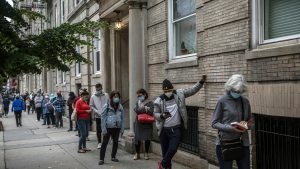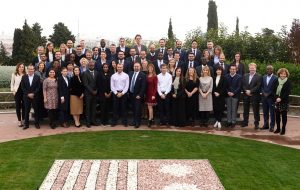
Although I probably should write about the upcoming presidential election in the U.S., I am sure that at this point I will not convince anyone to change their mind about Donald Trump or Joe Biden and besides that, it seems like 60 million Americans have already voted including me!
What I found much more interesting than the Donald Trump Show was watching the video blogs that my Global Executive MBA students sent me explaining their views on sustainability.
I teach my course, Strategy & Sustainability, in the final week of the program which is 16 months long and takes the students to 6 cities on three continents. Although IESE Business School makes an enormous effort to stress the ethical responsibility of business in every lecture and case study, we have sustainability in the final week to make sure that the message strikes home.
The course is relatively short as compared to the full-time MBA course but covers much of the same territory with cases on the oil business, the consumer products sector and a concept called the Blue Economy which is the title of a book published by Gunter Pauli. We also had Jamie de Jeraize, the President of LG Iberia who spent an hour with the class to explain the movement they have launched called Smart Green.
I ask the students to record a 2-3 minute video blog sharing their views on the topic as I find video is a great way to get students to tell you what they really think.

This year my students really impressed me with their creativity, conviction, and practical ideas about how to make the world more sustainable at the levels of government, business, and in their personal lives.
Several students from the fashion industry spoke about how their business needed to change in a fundamental way since about half of the new clothes manufactured every year end up in landfills.
Students in financial services spoke about the relatively low footprint that the industry produced but the enormous responsibility it had in terms of the investments it supports.
Others, including a student in the fishery business in Latin America, spoke about the opportunity of using a true and deep commitment to sustainability to differentiate their products and services. Interestingly enough, this argument was also made by students in real estate development from several places around the world.
Students from developing countries spoke clearly about the challenge of increasing prosperity in their countries in a sustainable way. One of these students felt the key lay in education while another was deeply concerned that the wealthy, developed world might use a sustainability argument as a way to keep poor countries poor. perhaps the freshest insight came from a woman in an advanced economy who struggled with her own values and how to balance the economic development of billions of people around the world with the need to avoid catastrophic global warming.
At the personal level my students told me how they were changing their consumption patterns, the things they purchased, and even the food they ate to live a more sustainable life.
Several spoke about the positive effects that efforts to control the spread of SARS-CoV-2 have had on the natural world. Their point was that perhaps we do not need to stress economic growth quite so much and look for a more nuanced view as to what progress means.
Our students in this program are typically in their late 30s and early 40s and come from all over the world. They have an average of 15 years of experience and are truly seasoned executives.
Their collective commitment to building a more sustainable future shows me that we really are at a tipping point concerning sustainability in terms of the global business community.
 Assuming that the American people elect Joe Biden perhaps he can provide true leadership for the U.S. and the world at the governmental level.
Assuming that the American people elect Joe Biden perhaps he can provide true leadership for the U.S. and the world at the governmental level.
His program calls for the gradual phase-out of fossil fuels by 2050 and to re-establish the U.S. as the leader in the transition to a low carbon economy.

